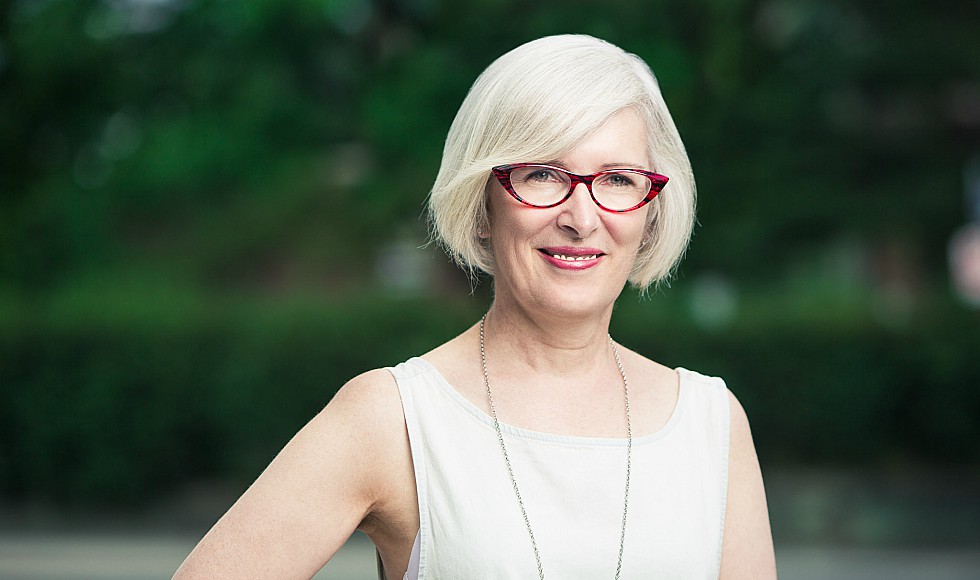Why understanding celebrity culture matters

BY Erica Balch
February 23, 2018
From Canadian literary icons Margaret Atwood, Alice Munro and Michael Ondaatje, to international stars like John Cusack, Lorraine York has spent much of her career trying to understand the world of celebrity and what it tells us about society.
York, a professor in McMaster’s Department of English and Cultural Studies who was recently inducted into the Royal Society of Canada, has written widely on the rise of Canadian literary celebrity and its impact on the “Can Lit” industry.
Not only has her ground-breaking work been met with acclaim – her 2013 book Margaret Atwood and the Labour of Literary Celebrity Culture was shortlisted for the prestigious Gabrielle Roy Prize – her research helped to stimulate a new era of scholarship in this field.
More recently, she has shifted her focus toward exploring international celebrity culture, and is considered a pioneer in this growing area of research.
How did you become interested in the study of celebrity?
I was happily trained as a Canadian literature specialist, I remain committed to that field and I still contribute to it, but from the beginning, I was very interested in how that field bumped up against other media. I also became interested in writers, not only what they write, but how they present themselves and are presented by others publicly and how that affects the literary marketplace. I found that the language I needed to think about that was actually the language of celebrity.
That led me to Margaret Atwood because a lot of the research in celebrity studies was talking about celebrity not only as the study of one individual, but as a study of a whole industry and the various forces and agents within that industry. I thought if I were to think in that way about Canadian literature, who is the industry? It’s Margaret Atwood.
Why is it important to study the impact of celebrity?
Celebrity culture is pervasive – in a sense, we almost debate certain issues by displacing them onto celebrities. When we gossip about celebrities, we may be trying out certain ideas of how we should be, or should not be. What we approve of, or disapprove of. What’s meaningful to us, or what we don’t find meaningful.
It’s understanding that celebrity culture is not trivial, it’s not random – it’s complicated. It’s not only about what’s produced by, say, a multinational entertainment corporation, it also has to do with how we make sense of these things in our lives – it’s part of the process by which we make meaning.
What does celebrity tell us about ourselves and about the society we live in?
In spite of the fact that there are a lot of chuckles to be had about the popular world – and certainly in the celebrity world – there are also serious interactions going on. For example, an actor’s portrayal of something can have real world consequences for people who are consuming that performance. Maybe it’s something the actor says or does publically, or the causes he or she might support.
Also, if you’re in a situation or identity category where your own family is not a welcoming place for you, the world of celebrity can also be a meaningful space – like for young, queer people, for example. So, there are real world implications for the things we often think of as fairly ephemeral.
What is the focus of your research now?
I just finished writing a book called “Reluctant Celebrity.” I’m really interested in that move that you often see celebrities make where they say, ‘I am a public person, but I don’t really want to be. I’m doing this, but I have grave doubts and misgivings.” So, I’m really interested in this backward, forward, ‘I’m doing this, but I don’t want to do it’ effect which is reluctance.
Often in the celebrity field, that kind of reluctance can been seen as promotion or bad faith, that they’re just saying that because they want more attention. But I think there’s a little bit more to it than that. In some cases, there might be legitimate thoughts about the loss of privacy. But also, celebrities who feel able to publically espouse their reluctance are themselves privileged in some way – if you’re struggling to get somewhere, you can’t say, ‘I don’t want to do this.’
Can you give me an example of a reluctant celebrity?
John Cusack is an interesting case, he’s one of the reductants. He’s an activist – a lot of his time is given over to anti-globalization activism and a lot of his reluctance has to do with building up a type of energy or capital that he can divert to that cause. So, reluctance can build energy that you want to spend somewhere else.
What has been the highlight of your career?
My graduate supervisees – the people I’ve worked with in the PhD program.
They’re always thinking ahead. I have one student who is thinking about the implications of young women’s fandom, which often gets denigrated. In other words, your emotional responses to things don’t matter because you’re immature and silly and we’re all going to laugh at you. I have another student who is doing amazing work on social media, Facebook and Twitter. So that’s the highlight right there, getting to think alongside those people.
You were recently inducted into the Royal Society, what was that like for you?
It was very meaningful – I feel happy that there is some recognition being given to popular culture studies because there has been a history of not seeing it as intellectually rigorous, seeing it as trendy. I’m happy there’s some recognition that you can think seriously and critically about the popular – those things that we bump into and think about and talk about every day.


